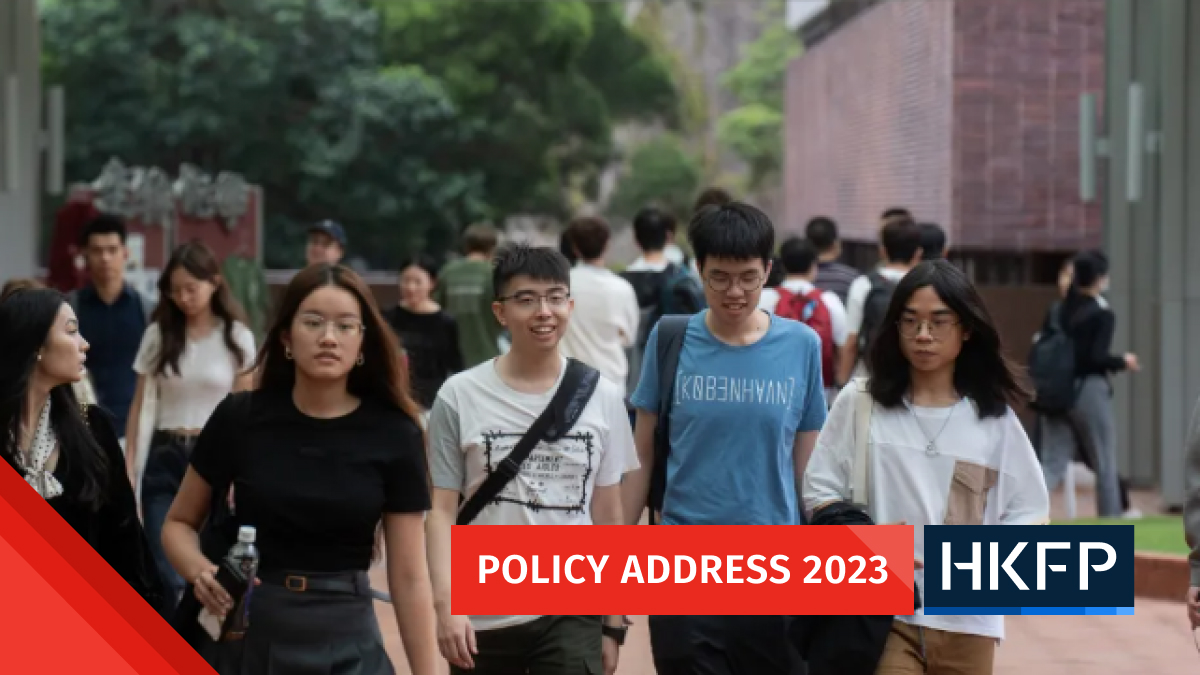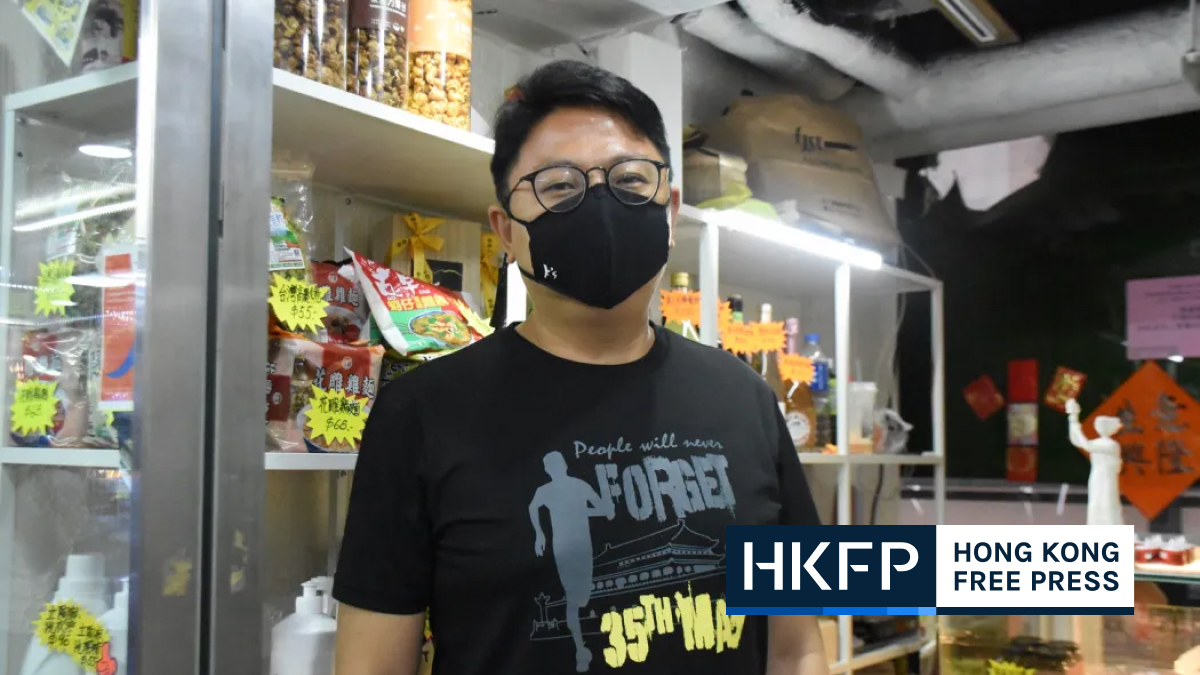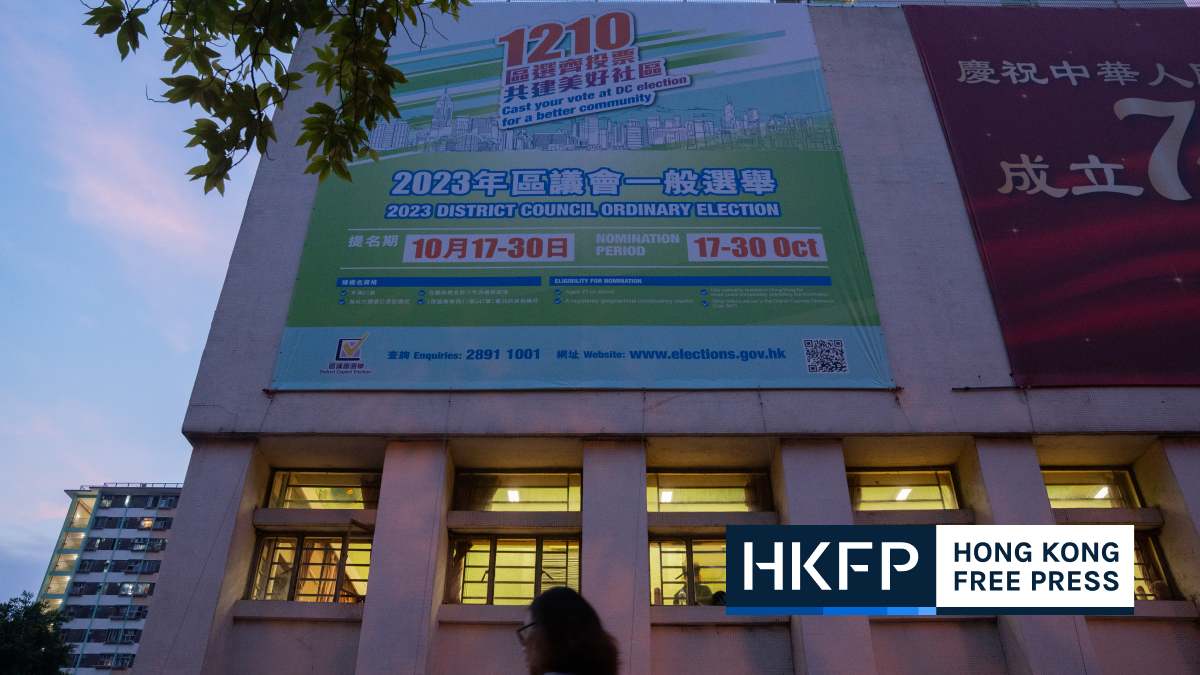Like many other migrant workers who leave their hometowns, Dolly Singh* came to Hong Kong from India in 2019 to support her family.
The then 24-year-old Punjabi thought she could trust a distant relative in Hong Kong to employ her as a domestic worker. When she arrived, she signed her name on a blank sheet of paper; a “contract,” which she never saw again.

Her relative did offer her a job but it came without a salary. For seven months, Singh was not paid for her work. When she complained, her employer verbally promised to pay her HK$1,500 per month – less than one-third of the statutory minimum wage for domestic workers in Hong Kong. But, Singh never received that either.
Adding to her misery was the maltreatment she faced. “I did not have sufficient food to eat. I could only go out with their child. I was not allowed to have friends,” Singh said, adding that she was “verbally abused” by her employer.
Singh is one of many migrant domestic workers (MDWs) to have experienced exploitation in Hong Kong.
According to statistics from the Immigration Department, there were more than 339,000 MDWs in the city in 2021. Most came from the Philippines and Indonesia, as well as other Asian countries. Research done by Justice Centre Hong Kong in 2016 found that 17 per cent of the MDWs in Hong Kong were in forced labour, and 14 per cent of those had been trafficked.
When people hear of “human trafficking,” they often think of kidnapping and abduction, or associate it with the sex industry. However, according to United Nations Office of Drugs and Crime, human trafficking does not necessarily involve the use of force. Many victims end up being exploited in sectors such as construction, agriculture, and domestic work – as in Singh’s case.
“I did not know what to do at all… I did not speak any English and I needed the job. I had to support my family,” Singh told HKFP.

A Pakistani domestic worker Singh met when she took her employer’s child to kindergarten told her to leave her job. “She spoke Hindi, too, so I was able to share my situation with her. And she told me it was wrong and that I should ask for help,” Singh recalled.
Singh started looking for the contact details and services of non-governmental organisations online. Around this time, she said her employer attempted to molest her. Singh stopped him but started to feel unsafe and ran away one early morning, leaving her belongings behind her. A stranger she met in a park helped her to call the NGO HELP for Domestic Workers.
Lengthy legal processes
What Singh faced next was another gruelling process. Danilo Reyes, Singh’s caseworker with HELP for Domestic Workers, explained every legal option available to her. But unable to speak English and traumatised by her experience, Singh had trouble understanding the possible processes, even with help from Reyes and a translator.
“At first, it was very confusing. I did not know what was going on. I did not trust the NGO fully. I was afraid that the people who were helping me would back out,” Singh said.
Eventually, Singh filed a claim to the Labour Tribunal for her unpaid wages and her personal affairs and a criminal claim of indecent assault against her employer. The government also opened an investigation into whether Singh had been a victim of human trafficking.
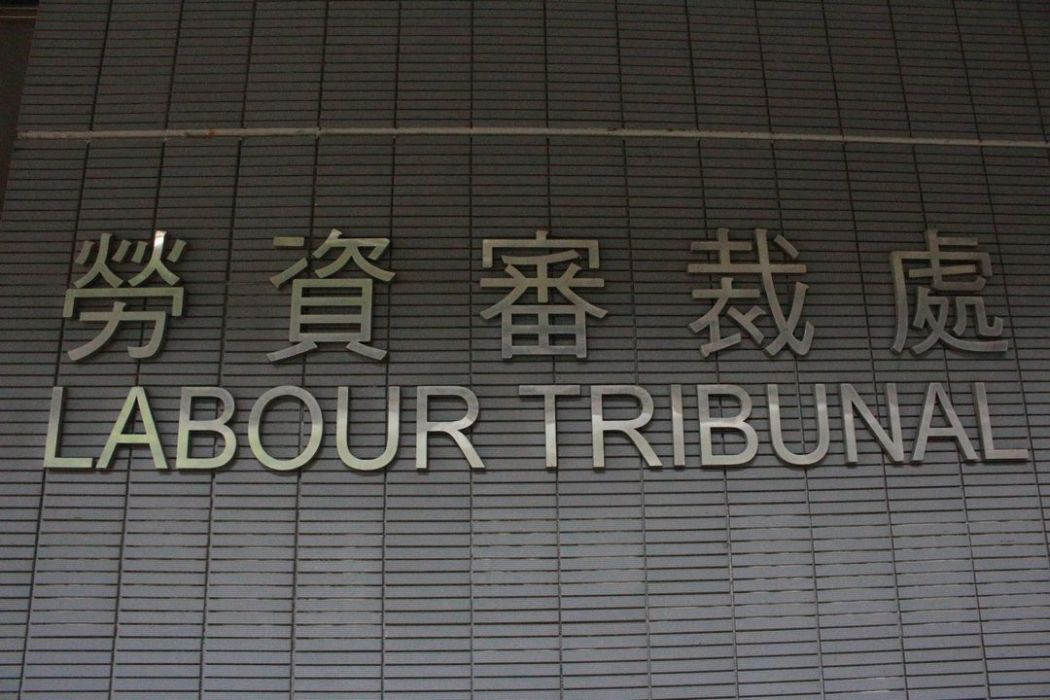
Introduced in 2015, Hong Kong’s Trafficking in Person (TIP) screening mechanism aims to identify victims of trafficking from vulnerable people who have been arrested or who have approached the authorities.
According to the Security Bureau, nearly 37,000 initial screenings were conducted between 2016 and 2021, with a total of 40 victims identified.
“TIP victim screening is not simply a questionnaire-filling procedure or an application, but a crucial part of an investigative process,” a Security Bureau spokesperson told HKFP in June. “Under normal circumstances, interviews would be conducted by well-trained frontline officers of the respective departments.”
Yet, many NGOs said that the screening mechanism was notoriously unfriendly to victims, with many dropping out of the process or avoiding reporting their cases at all, because it could be a draining process that many want to avoid.
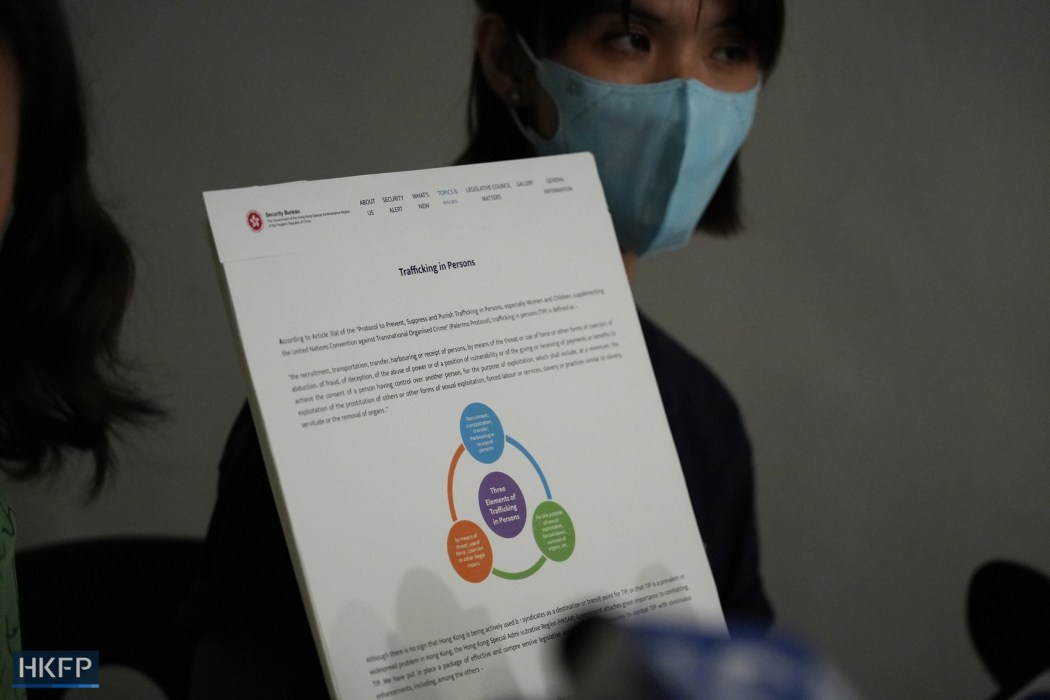
Crystal Yeung, a solicitor and the Head of Casework and Research at the Hong Kong Dignity Institute, said frontline law-enforcement officers often do not appear to trust the victims, adding that they rarely identified them as such anyway.
“It [the interview] is done poorly because the police have the mindset of talking to a defendant, a criminal. But these people are vulnerable. They have experienced exploitation and abuse,” Yeung said. “The screening mechanism exists to protect these people but as they are being assessed, the police are exacerbating the traumatic experiences for them. It is not friendly.”
In August 2018, the Security Bureau established a joint investigation protocol, “under which potential victims will be jointly interviewed by relevant departments where needed, so as to spare them the agonies and traumatic experience of going through separate interviews and repeating the same story,” the bureau spokesperson said.
“Welfare of the persons concerned during screening is also one of the key issues which would be duly taken into account by the relevant officers.”
However, the process can take a long time.

Michelle Wong is the Programme Manager from Stop Trafficking of People (STOP), a frontline anti-trafficking organisation that has served over 60 trafficking victims since 2017.
“We avoid taking our clients to the government screening procedures because it often takes many months. In each session, the victim has to stay for eight, if not more than ten hours and recount their ordeals,” Wong said. “It is exhausting and retraumatising.”
Despite the “joint investigation protocol” set up by the Security Bureau, the NGO said investigations were often carried separately and without cooperation between different administrative departments. Victims were asked the same set of questions repeatedly, they said.
This was also Singh’s experience.
Recounting what happened to me repetitively was very stressful. I broke down and cried
Dolly Singh, trafficking victim
Amid the Covid-19 pandemic, her legal procedures stretched into five months, during which Singh was called to different government departments to give statements, she said, causing her great distress and anxiety.
“Recounting what happened to me repetitively was very stressful,” Singh said. “I broke down and cried.”
The process put great pressure on Singh, who also worried about how to support her family financially. Singh’s relatives have been divided by her decision to pursue the case. “Everything in my family depends on my job and I could not work when I had a case,” Singh said.
Ultimately, Singh did not want the case to drag on and chose to withdraw the criminal claim, while the labour case was settled. Reyes, who is also the Head of Case Management and Research of HELP for Domestic Workers, said this was common.

“[The victims] just want to forget it. The whole process of [the court] hearing and remembering the details of their experiences in various interviews is just too long and painful,” Reyes said.
Lack of legislation
In March 2018, a TIP working group chaired by the Security Bureau published an action plan to tackle human trafficking and enhance protection of migrant domestic workers in Hong Kong. The plan introduced “necessary protection and suitable assistance” for those in need, including legal immunity, psychological counselling and financial assistance.
Singh did not receive any government assistance. Her expenses during the five months, including for a visa extension, an allowance for her basic needs and the cost of living in a shelter, were covered by HELP for Domestic Workers.
The Security Bureau said that “Specific statistics were not maintained on the… protection and assistance provided to TIP victims.” But it emphasised the small number of identified victims in the past few years, “indicating that TIP has never been a prevalent problem in Hong Kong.”

The statement is familiar to those who follow the issue. A US Department of State report on trafficking in Hong Kong released in July stated that the “implementation of the screening mechanism and victim identification was ineffective and inconsistent.” In response, a government spokesperson said, “It is unfair and groundless to cast doubt on the quality of our screenings and discredit our screening procedure merely because of the low number of victims so identified.”
Matt Friedman, the Chief Executive Officer of the Mekong Club and an expert in international human trafficking, said he believed the administration was trapped in a vicious cycle of denial and a lack of action.
“If the government is stating that they do not have an issue, then they do not feel the need to look for it,” Friedman said, “They do not look for it, they do not find it. Part of the reason they do not find cases is that they do not self-identify the problem.”
Road to recovery
After the dust had settled, Singh found another employer. And while she still has doubts to overcome, she said has been emboldened by her experience.
“I still feel frustrated that it took so long for me to speak up. I wish I could have done so sooner,” she said. “But I have gone through the worst. And I did not keep quiet. I took a step on my own to leave the situation.”
Encouraged, Singh has volunteered in a leadership and peer support programme organised by HELP for Domestic Workers. The programme invites survivors of human trafficking and exploitation to raise awareness and help those stuck in similar circumstances.
Reyes, who is responsible for the programme, said it was effective. “Community leaders offer insights, guidance and support to domestic workers seeking help,” he said. “It is very encouraging and humanising to learn that others have some similar difficulties, thoughts, and emotions. Through shared experiences, support and collaborative problem-solving the members of the community benefit emotionally.”
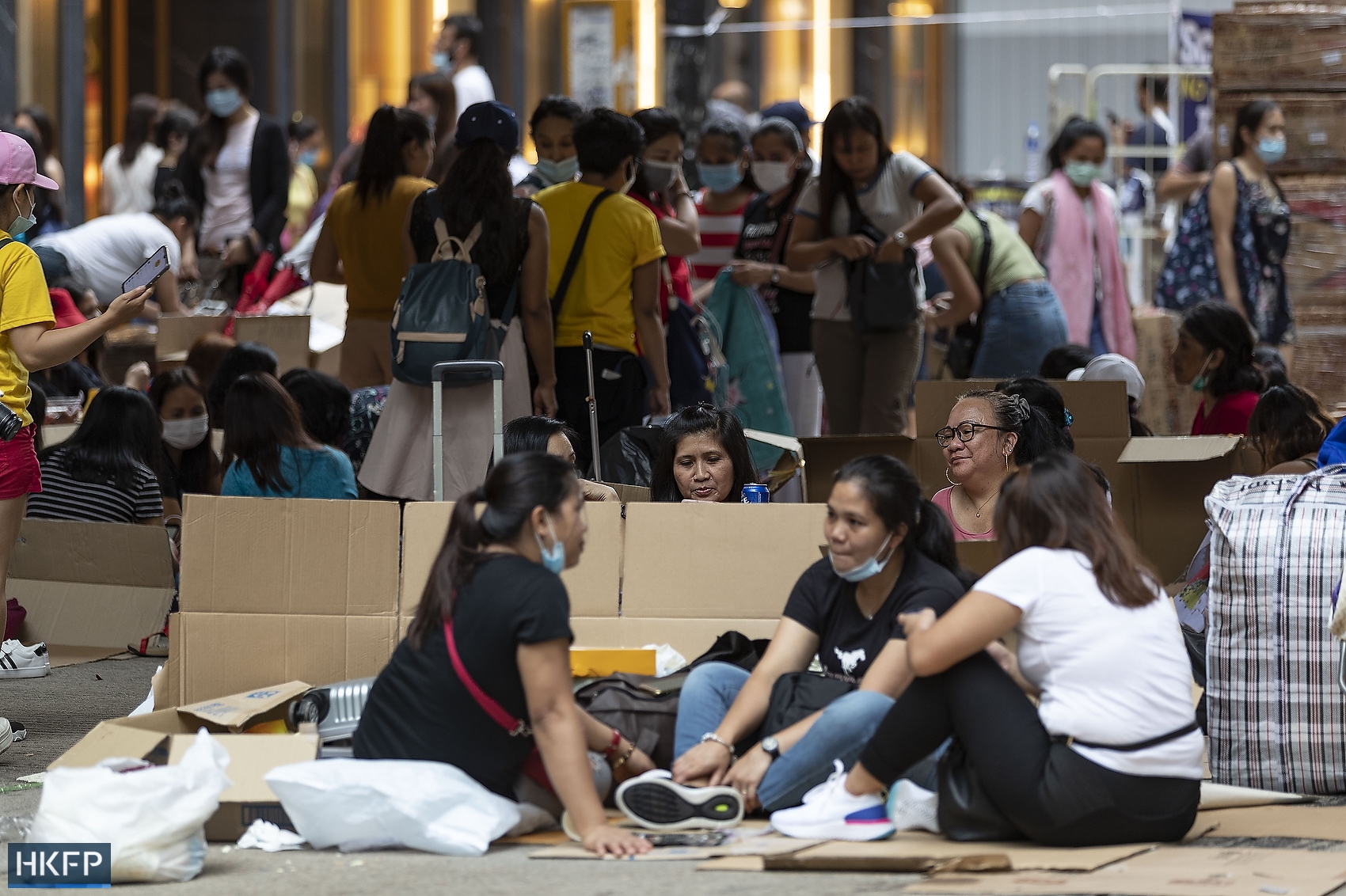
A 33-year-old Filipina domestic worker who goes by the name Eva is one of the programme’s leaders. In 2018, Eva’s former employers went to Thailand, leaving her alone in Hong Kong. She said she was not supposed to go out even though she had to visit the doctor regularly due to her poor health. After returning to the city, her employers ended her contract. They neither gave Eva one-month notice nor paid her one month’s salary in lieu of notice, which is required by law.
It took nine months and three hearings at the Labour Tribunal before Eva’s former employer finally paid her what she was owed. Knowing how lengthy and nerve-wrecking the legal process can be, Eva can easily understand the plight of other victims.
“I just want to help others… to share the knowledge I wish I had when I was exploited. I want to tell them what these [legal] procedures mean, what they can do and what their rights are,” she said.
At the time of the interview with HKFP, Singh had received her training and had just started volunteering for the programme. She is also an active member of a mutual self-help group, lending a helping hand to those in need and offering her free time to chat. Like Eva, Singh sympathised with those undergoing trials or screening, patiently explaining the relevant procedures to them.
For Singh, though, being a part of the programme was not just an altruistic experience. It was also empowering. “I learn new things and make new friends. I am empowered with knowledge and experiences that I can raise awareness in my community and support others to overcome the plights,” she said.
“I am no longer scared and silenced.”
* Dolly Singh spoke to HKFP on the condition of anonymity using a pseudonym. The interview was conducted in Punjabi with translation services provided by Avril Rodrigues, Communications and Community Engagement Manager of HELP for Domestic Workers.
Clarification 5/9/2022: An earlier version of this article misrepresented the approach taken by Stop Trafficking of People towards Hong Kong’s Trafficking in Person screening mechanism. We regret the error.
Support HKFP | Policies & Ethics | Error/typo? | Contact Us | Newsletter | Transparency & Annual Report | Apps
Help safeguard press freedom & keep HKFP free for all readers by supporting our team

LATEST FROM HKFP
HKFP has an impartial stance, transparent funding, and balanced coverage guided by an Ethics Code and Corrections Policy.
Support press freedom & help us surpass 1,000 monthly Patrons: 100% independent, governed by an ethics code & not-for-profit.


